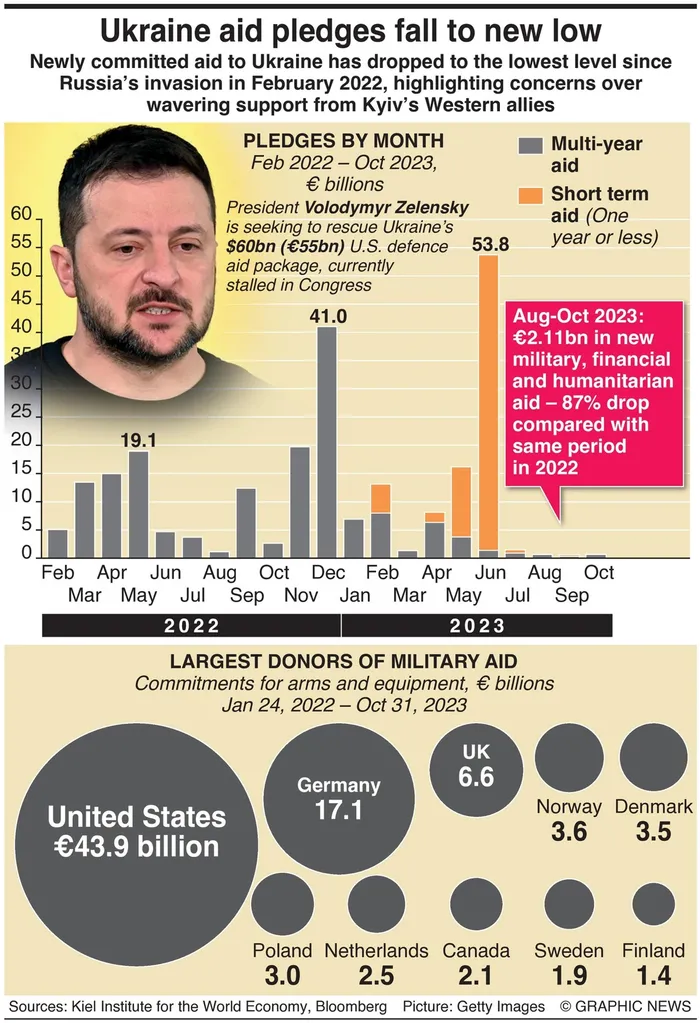Allies fear defeat as aid to Kyiv stalls

Image: Graphic News / December 11, 2023 – Newly committed aid to Ukraine has dropped to the lowest level since Russia’s invasion in February 2022, highlighting concerns over wavering support from Kyiv’s Western allies. This graphic shows aid commitments to Ukraine from February 1, 2022 to Oct 31, 2023, and the largest military donors to Kyiv.
Picture: Anatolii Stepanov / AFP / Taken on November 4, 2023 – Ukraine's President Volodymyr Zelenskyy speaks at a joint press conference with European Commission President following their talks in Kyiv on November 4, 2023, amid the Russian invasion of Ukraine. As funding from the US and Europe is in limbo, Ukraine and its allies must contemplate something they’ve refused to imagine since the earliest days of Russia’s invasion: that President Vladimir Putin may win, the writer says.
By AFP and Bloomberg
President Volodymyr Zelenskyy said this week that there was no end in sight to Russia’s invasion of Ukraine, as fatigue built among Kyiv’s allies nearly two years into the war and the Kremlin voices grew confident of victory.
Zelenskyy said he had turned down a request from the military – for now – to mobilise as many as 500,000 Ukrainians for the army, an unpopular proposal that could hit his worsening poll ratings among Ukrainians.
His meeting with local and foreign journalists wraps up a difficult year in Ukraine, with Kyiv’s forces under pressure on the front, and allies wavering on military and financial backing.

“No one knows the answer,” Zelenskyy said in response to a question of whether the war with Russia could end next year.
“Even respected people, our commanders and our Western partners, who say that this is a war for many years, they do not know,” he said.
The question of how long Western countries will provide essential support for Kyiv has grown increasingly urgent.
The impasse over aid from the US and Europe has Ukraine’s allies contemplating something they’ve refused to imagine since the earliest days of Russia’s invasion: that President Vladimir Putin may win.
With more than $110 billion (about R2 trillion) in assistance mired in political disputes in Washington and Brussels, how long Kyiv will be able to hold back Russian forces and defend Ukraine’s cities, power plants and ports against missile attacks is increasingly in question.
Beyond the potentially catastrophic consequences for Ukraine, some European allies have begun to quietly consider the impact of a failure for the North Atlantic Treaty Organisation in the biggest conflict in Europe since World War II.
They are reassessing the risks an emboldened Russia would pose to alliance members in the east, according to people familiar with the internal conversations who asked for anonymity to discuss matters that aren’t public.
The ripple effects would be felt around the world, the people said, as US partners and allies questioned just how reliable Washington’s promises of defence would be. The impact of such a strategic setback would be far deeper than that caused by the spectacle of the botched US pull-out from Afghanistan in 2021, they said.
The growing sense of alarm has slipped into some leaders’ public statements.
“If Ukraine doesn’t have support from the EU and the US, then Putin will win,” Irish Prime Minister Leo Varadkar said last week at the EU summit, where leaders failed to overcome growing opposition to next year’s €50bn (about R1 trillion) aid package and only barely managed to approve the largely symbolic gesture of opening the way to membership for Ukraine in the future.
Meanwhile, Russia’s plans for the manning of its army and navy have been achieved this year.
Their number had reached 1.15 million service members, Russian Defence Minister Sergei Shoigu told a defence ministry meeting this week.
Since December 1, the Russian Defence Ministry has started to increase the number of the armed forces to 1.32 million people, the minister said.
By the end of next year, Russia planned to increase the number of contract service members to 745,000 people, Shoigu said. – AFP and Bloomberg